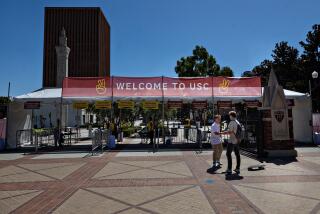Cal State applicants to get warning letter about tax initiative
SACRAMENTO — Hundreds of thousands of applicants to California State University campuses this year will be receiving a warning instead of the typical warm note thanking them for their interest.
The spots they are hoping to fill next year, the prospective students will be cautioned, could evaporate if the governor’s push to raise taxes in November fails. The letter also will say no admissions decisions will be made until a few weeks after the election, a departure from the usual policy of notifying applicants beginning in October.
The likely take-away: Vote Yes on Proposition 30 to help boost your prospects.
“Because enrollment capacity is tied to the amount of available state funding, the campuses will be able to admit more applicants if Proposition 30 passes and fewer applicants if the proposition fails,” says a draft of a letter to be emailed to applicants at CSU Monterey Bay starting Oct. 1.
If the measure passes, it says, “the CSU budget would be less likely subject to cuts, and potentially could be increased in future years.” The missive notes that the Board of Trustees has endorsed Proposition 30 and includes a link to the Yes on 30 campaign.
The next, and final, line of the letter contains the only acknowledgment of arguments against Proposition 30 in the form of a link to the No campaign.
Every CSU campus will send out a similar letter, university officials said. Most of the prospective students are also potential voters, but the officials vehemently denied any political undertones in their message.
“We wanted to give students and parents some sense of context as to why we are [holding] applications until the end of November,” said Claudia Keith, spokeswoman for the CSU system. “We are not advocating one way or the other. We are just laying out the facts of what the budget is and what impact this will have on our budget.”
Anti-tax advocates say CSU is using government resources for a political campaign, which is illegal. On Friday, Jon Coupal, president of the Howard Jarvis Taxpayers’ Assn., sent a letter to university officials asserting that their plan appeared to run afoul of the law.
At least one university official has more riding on Proposition 30 than the impact it could have on the classroom. Steven Glazer, who sits on the CSU Board of Trustees, is a chief political advisor to Gov. Jerry Brown and a mastermind of the tax measure.
In an interview Friday, Glazer said trustees were not involved in the decision to send the letters. He called it a “day-to-day system management issue” and said, “I was not consulted on it.”
But Glazer said he supports the move. “It is entirely appropriate to provide material facts to students and families that could affect our admissions decisions,” he said. “Our enrollment and our budget are intricately tied together.”
If Proposition 30 fails, Brown has said, each of the two public university systems will lose $250 million in state funds.
Officials at the University of California said they are trying to educate people about the measure through a website but have no plans to send letters.
At CSU, the letters are part of a bigger effort to focus public attention on Proposition 30. University officials have warned repeatedly about disastrous consequences if the measure fails.
At their meeting next week, the trustees will vote on a proposed 5% increase in tuition to be enacted if the measure fails. The board will also discuss a proposal — one much more attractive to students — that could go into effect if Proposition 30 passes: a rollback of the last tuition hike. That would mean hundreds of dollars in rebates for tens of thousands of students.
The ballot measure would raise billions of dollars for the state budget by temporarily increasing sales levies and income taxes on high earners. Polls show it currently has the support of a slim majority of Californians, and proponents are scrambling for every vote they can muster.
Support from students could affect the outcome. Last fall, 269,351 students applied for CSU admission, according to Keith.
Robert Stern, an author of state political law, said university officials are permitted to educate prospective students about how a ballot measure might affect the system, as long as they don’t ask for a vote one way or another.
“Governments can send out information on the consequences of propositions,” he said.
Coupal said the university is doing more than educating prospective students.
In the letter he sent to CSU Chancellor Charles B. Reed on Friday, he wrote: “It is a serious breach of the public trust when government officials spend public funds to create an advantage for one side of a political campaign…. In order to avoid litigation over this matter, we demand that California State University immediately cease using its funds, school property, personnel, supplies or equipment to influence the election.”
More to Read
Sign up for Essential California
The most important California stories and recommendations in your inbox every morning.
You may occasionally receive promotional content from the Los Angeles Times.











